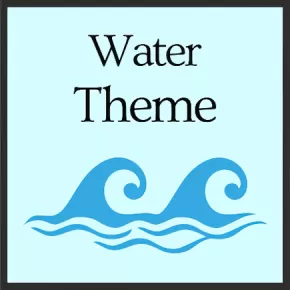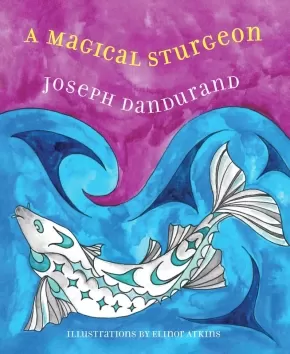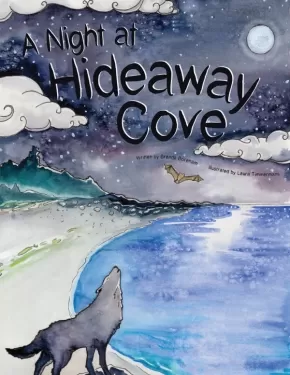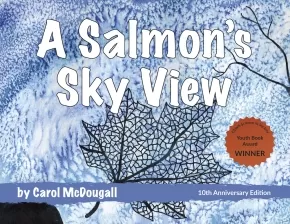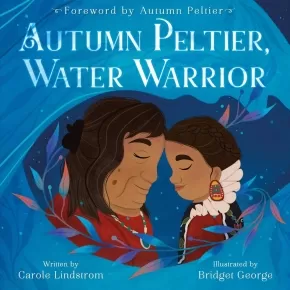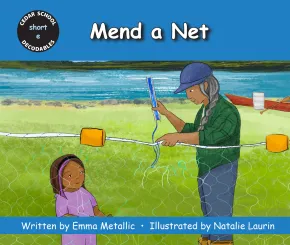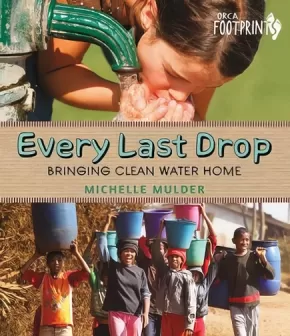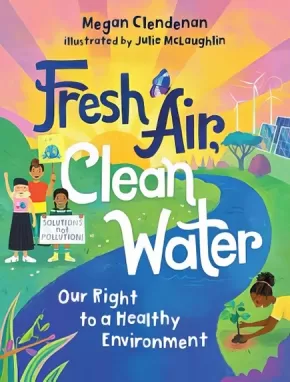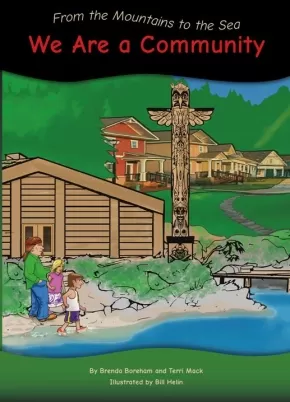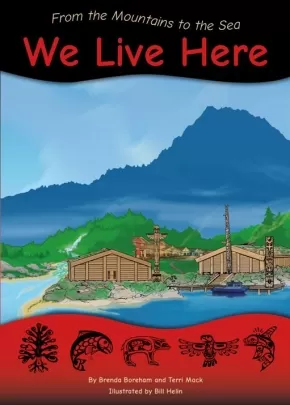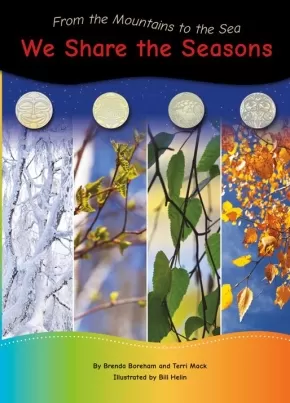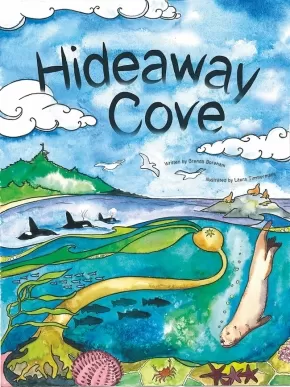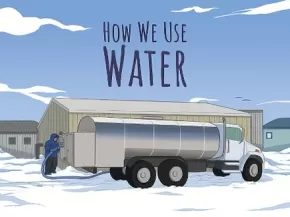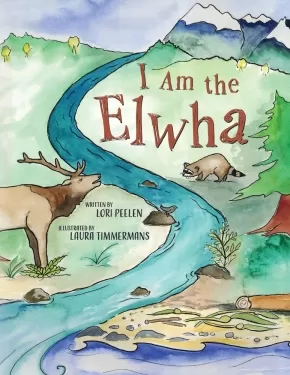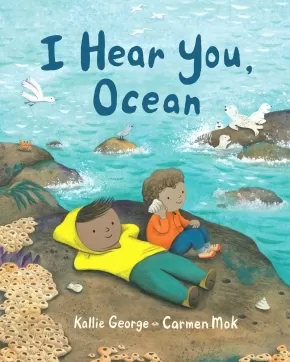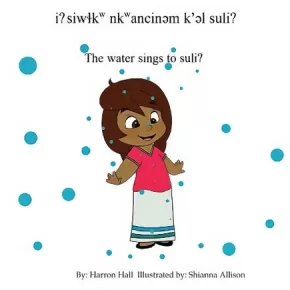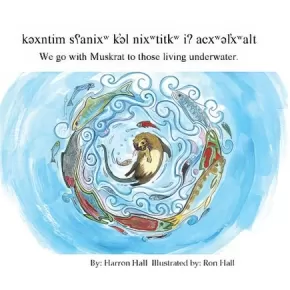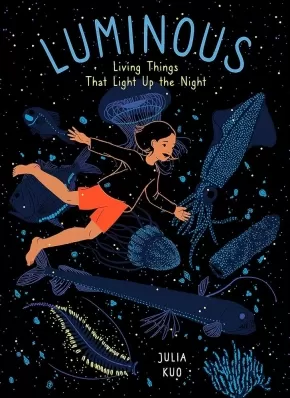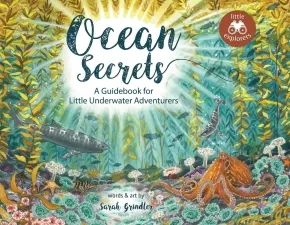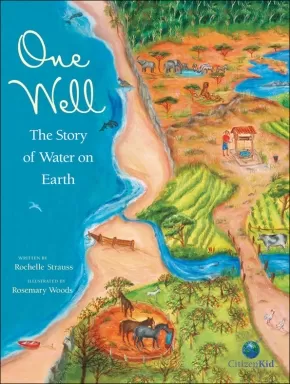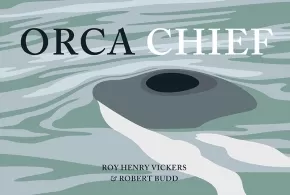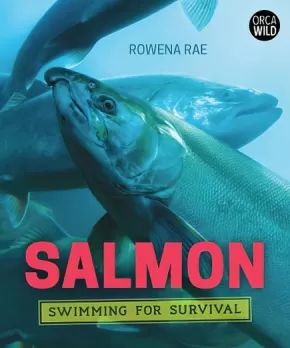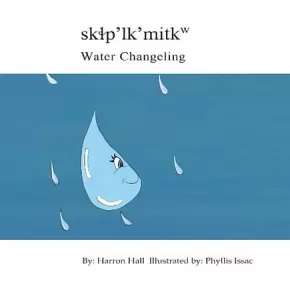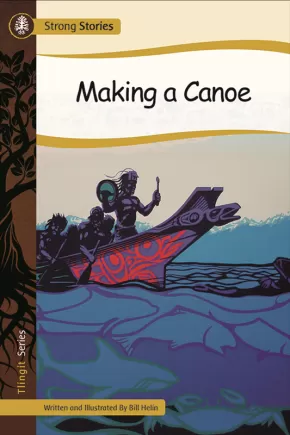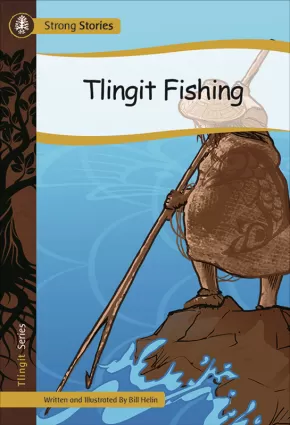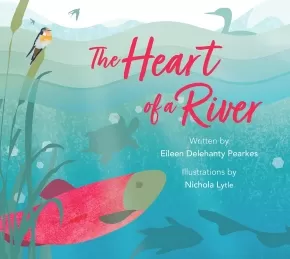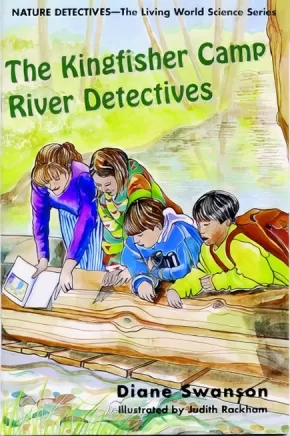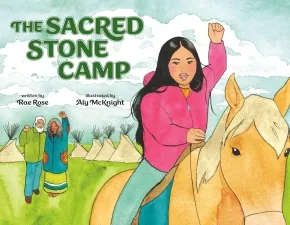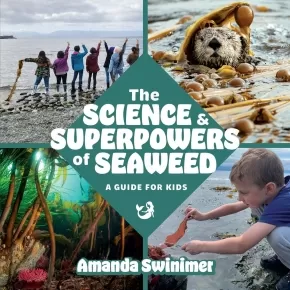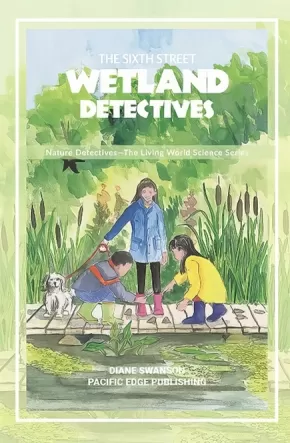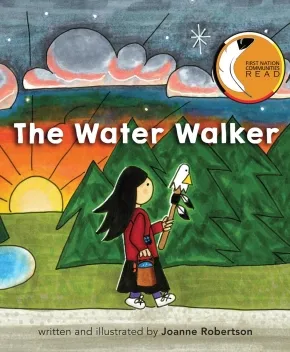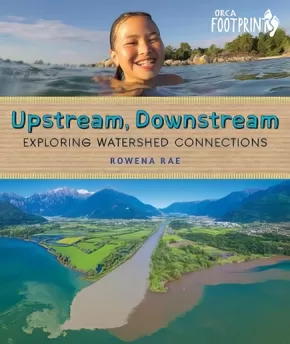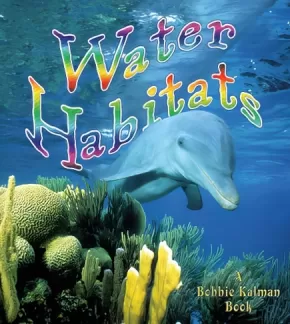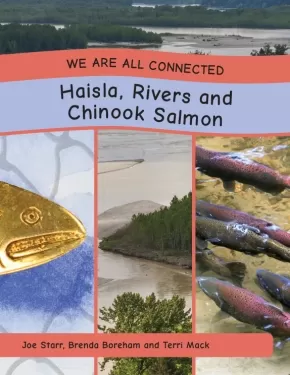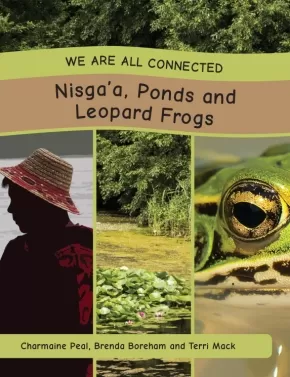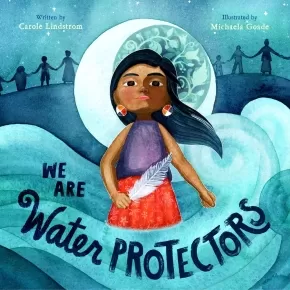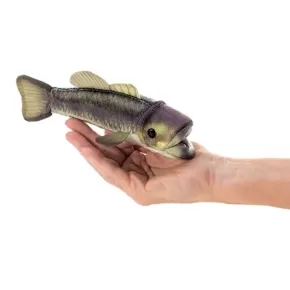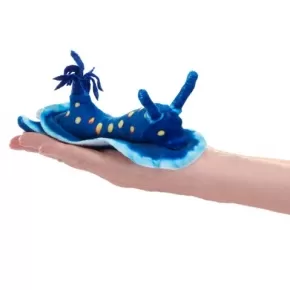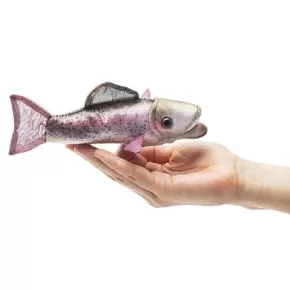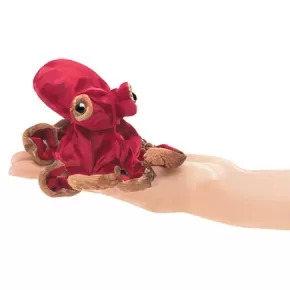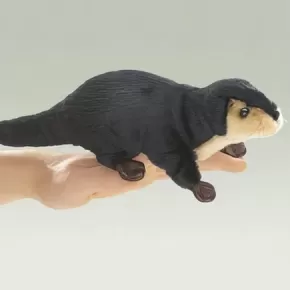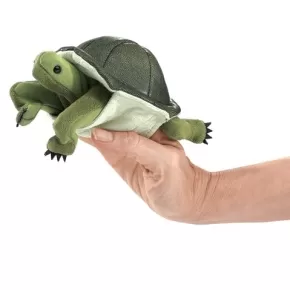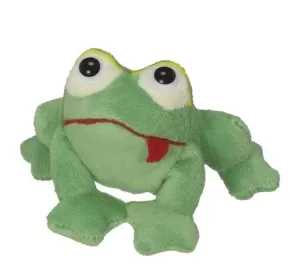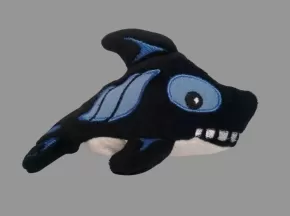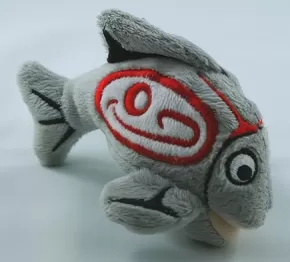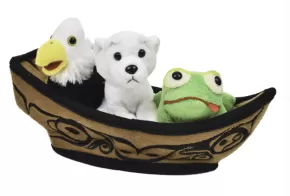
Theme Bundle: Water
$971.48
Text Content Territories:
Indigenous Canadian;
Status: Available
Details:
This theme bundle includes Indigenous and supplementary books (fiction and nonfiction) and learning environment resources for learning about water.
Keywords: Natural Water Cycle; Traditional Ecological Knowledge; Water Footprint; Water Conservation; Water Protectors; Watersheds; Lakes; Rivers; Oceans; Ponds; Water Habitats; Wetlands; Estuary; Underwater Creatures; Nibi; Dams; Environmental Awareness; Seashore Ecosystem; Fishing
Scroll below to learn more about the Indigenous and supplementary resources included in this bundle. Resource availability may fluctuate.
● The listed materials for this bundle
can be purchased as a full bundle or separately. To purchase the full bundle click on the "Add to
Basket" button above (the first one on this page).
● To purchase items individually, click the "Add to Basket" buttons below, beneath the individual
item titles.
Books
A Magical Sturgeon
$15.95
Artists:
Format:
Paperback
Text Content Territories:
Indigenous Canadian; First Nations; Salish; Coast Salish; Sto:lo; Kwantlen;
ISBN / Barcode: 9780889713901
Synopsis:
Synopsis:
Written and illustrated in the tradition of the Kwantlen people, Joseph Dandurand's second book is an endearing tale of two sisters and their connection with nature.
In the water sat a sturgeon, born there, so they say, thousands of years ago, though the sturgeon themselves have been here for two hundred million years. It was at first a little egg, a big egg, born into the river. Now the sturgeon is back but how did it get here? How did the first sturgeon come to be? Earth and the river, moons and suns and clouds. Time, thousands of years and the Skwó:wech has seen it all. But what gift does the sturgeon have for us?
So begins this second charming story for children by Kwantlen storyteller Joseph Dandurand. The sturgeon, spirit of the great river, eludes human fishers until two young sisters neglect to follow their mother’s instructions. What follows provides a moving exploration of the importance of sharing and kinship with all other living things.
The story is told with grace and simplicity by a master storyteller in the great tradition of the Kwantlen people. Accompanied by Elinor Atkins’s illustrations, A Magical Sturgeon is a touching follow-up to Dandurand’s bestselling children’s book The Sasquatch, the Fire and the Cedar Baskets.
Educator Information
Recommended for ages 6 to 8.
This is the second book in the Kwantlen Stories Then and Now series.
Additional Information
32 pages | 7.00" x 8.50" | Paperback
A Night at Hideaway Cove (PB)
 $14.50
$14.50

Artists:
Format:
Paperback
ISBN / Barcode: 9781771743303
Synopsis:
Synopsis:
Come with us, on a mid-August night, to a secluded beach on the Pacific Northwest Coast. There we will meet many creatures that make Hideaway Cove their home. From the black bear to the tiniest beach hopper, we will catch a glimpse of their night-time activities. We will also learn how the moon affects the tides, and explore the intertidal zones.
A Night at Hideaway Cove is a sequel to Hideaway Cove, another exploration of the Pacific Northwest Coast during the daytime. Written by Brenda Boreham, and illustrated by Laura Timmermans, both books share with us the many interconnections within a healthy marine ecosystem.
A Night at Hideaway Cove is a sequel to Hideaway Cove, another exploration of the Pacific Northwest Coast during the daytime. Written by Brenda Boreham, and illustrated by Laura Timmermans, both books share with us the many interconnections within a healthy marine ecosystem.
Reviews
"There are many thoughtful and charming details in both the text and illustrations, such as the moon’s movement across the sky in Laura’s illustrations and the subtle introduction of numbers as the narrative progresses. The moon is a large focus of the story—children will learn about how it affects the tides and what this means for beach creatures like raccoons, who are able to forage for an easy meal amongst the heaps of seaweed left along the shoreline as the tide goes out…. A Night at Hideaway Cove is sure to both delight and inform young readers." – Canadian Teacher Magazine, Winter 2019 issue
"There are many thoughtful and charming details in both the text and illustrations, such as the moon’s movement across the sky in Laura’s illustrations and the subtle introduction of numbers as the narrative progresses. The moon is a large focus of the story—children will learn about how it affects the tides and what this means for beach creatures like raccoons, who are able to forage for an easy meal amongst the heaps of seaweed left along the shoreline as the tide goes out…. A Night at Hideaway Cove is sure to both delight and inform young readers." – Canadian Teacher Magazine, Winter 2019 issue
Educator & Series Information
Each book in the By Day and By Night Nature Series focuses on a scene typical of a distinct west coast habitat, showing how living and non-living things are connected in a healthy ecosystem. As readers, we observe animals going about their daily activities: caring for their young, searching for food, and responding to the changes in light, temperature, and weather conditions throughout the day or night. The last four pages of each book provide facts about the highlighted animals and plants as well as features that are unique to their habitats. The final page suggests ways that young readers and their families can be respectful as they visit wilderness areas.
Readers with a sense of curiosity will find opportunities in these books to:
- use picture clues to predict the featured animal on the next page
- identify, count, and sequence numbers (1 owl, 2 deer, 3 squirrels, etc.)
- search for small creatures that travel from page to page
- discover patterns in the text and structure of the books
- track the movement of the sun, or moon, across the sky
Curriculum Links
Reading - Providing opportunities for guided practise in using reading strategies: visualizing, making connections, asking questions, transforming, and inferring.
Science - Supporting discussion and further exploration:
- characteristics of living things
- needs of living things
- connections between living and non-living things
- daily and seasonal changes
- animal growth and changes
- plant growth and changes
- weather
- habitats
- observable patterns in the sky
Numeracy - Counting and sequencing of numbers 1 to 10.
Social Responsibility - Initiating discussions about ways to take care of wilderness areas.
Search for a mouse that travels from page to page in this story!
Creative Nonfiction: A fictional story with factual information about the Pacific Northwest Coast, as well backmatter that delivers scientific information about the moon, intertidal zones, and seashore creatures.
Additional Information
32 pages | ISBN: 9781771743303 | Paperback
32 pages | ISBN: 9781771743303 | Paperback
A Salmon's Sky View
 $18.50
$18.50

Artists:
Format:
Hardcover
ISBN / Barcode: 9781771744461
Synopsis:
Synopsis:
The ink and watercolour illustrations in this book reflect the life cycle of a salmon from the salmon’s point of view looking up from underwater. Silhouette images provide a clue to the seasons and to the predators the salmon encounters throughout its life. The story reminds us how the salmon demonstrates great determination and strength in its long journey from the stream where life begins, to the ocean, and back to its natal stream.
Carol ends the story with a step-by-step instructional guide to create your own ink and watercolour image.
Educator Information
This is the 10th anniversary edition from CSWA Science in Society award-winning author/illustrator Carol McDougall, B. Ed., M.A. Carol is an international educator and conservationist with decades of classroom and fine arts teaching experience. She conducts workshops on using the arts to help make learning creative and engaging.
Recommended Grades: K-5.
Additional Information
32 pages | 11" x 8.5" | ISBN: 9781771744461 | Hardcover
A Spring Adventure With Beavers
 $11.95
$11.95

Artists:
Format:
Paperback
ISBN / Barcode: 9781771745673
Synopsis:
Synopsis:
“The kit uses her webbed back feet and little flat tail to push through the water. She swims down the tunnel and out into the pond. At the surface of the water, she sees a dragonfly. She follows it to the edge of the pond. It settles on a big rock.”
This book uses both fiction and non-fiction as a unique approach to storytelling.
On left-hand pages, lyrical text and colourful illustrations tell a story of a young beaver’s early morning spring adventure. Using her senses, the kit discovers the world around her lodge. Expertly woven into this delightful story are interesting facts about beavers and other plants and animals in this wetland ecosystem.
Captioned and labelled photographs, word boxes, a diagram, and a map make the non-fiction portion of this book an accessible source of information for young readers.
Educator & Series Information
This book is part of the A Spring Adventure series.
Recommended for grades 2 and 3.
Captioned and labelled photographs, word boxes, a diagram, and a map make the non-fiction portion of this book an accessible source of information for young readers.
Science Connections: Biodiversity, animal classification, food chains, life cycles, ecosystems, geology, and the connections between living and non-living things are some of the concepts included in this book.
Additional Information
24 Pages | 8" x 8" | ISBN: 978-1-77174-567-3 | Paperback
Autumn Peltier, Water Warrior
$24.99
Format:
Hardcover
Text Content Territories:
Indigenous Canadian; First Nations; Anishinaabeg; Wiikwemkoong Unceded Territory;
ISBN / Barcode: 9781250795274
Synopsis:
Synopsis:
From New York Times bestselling picture book author Carole Lindstrom and illustrator Bridget George comes Autumn Peltier, Water Warrior, an inspiring picture book biography about two Indigenous Rights Activists, Josephine Mandamin and Autumn Peltier.
The seventh generation is creating
A sea of change.
It was a soft voice, at first.
Like a ripple.
But with practice it grew louder.
Indigenous women have always worked tirelessly to protect our water—keeping it pure and clean for the generations to come. Yet there was a time when their voices and teachings were nearly drowned out, leaving entire communities and environments in danger and without clean water.
But then came Grandma Josephine and her great-niece, Autumn Peltier.
Featuring a foreword from water advocate and Indigenous Rights Activist Autumn Peltier herself, this stunning picture book from New York Times-bestselling author Carole Lindstrom and illustrator Bridget George gives voice to the water and asks young readers to join the tidal wave of change.
Educator Information
Recommended for ages 4 to 8.
Additional Information
40 pages | 10.45" x 10.30" | Hardcover
Benjamin's Thunderstorm
$21.99
Artists:
Format:
Hardcover
Text Content Territories:
Indigenous Canadian; First Nations; Cree (Nehiyawak);
ISBN / Barcode: 9781525303203
Synopsis:
Synopsis:
A thunderstorm evokes a boy's family traditions, in this rainy-day story from award-winning author Melanie Florence.
Benjamin loves the rain. He loves splashing through puddles in his bright yellow rain boots and watching the colors of a rainbow in the water as they ripple around his feet. But most of all, Benjamin loves thunder. To him, thunder --- piyêsiwak --- sounds like his grandfather's drum. It calls to him, like the songs his grandfather plays while his father and other powwow dancers spin and step in time to the drumbeat. As Benjamin hears the thunder rumble overhead, he imagines himself as a powwow dancer. He spins, he taps his feet and he lifts his knees. Faster and faster he twirls, delighted by and filled with the rhythm of piyêsiwak.
This artfully written story from award-winning author Melanie Florence celebrates both the universal joys of playing in the rain and the connections to family traditions that center and ground us. Elements of Cree powwow culture and Cree words for colors and weather are interwoven into the story, with a pronunciation guide in the back matter.
The vibrant and eye-catching art by Hawlii Pichette, inspired by the scenery of northern Ontario, adds drama to the pages. This inviting picture book makes a perfect read-aloud for a rainy day, as well as an excellent introduction to Cree cultural traditions, local communities and experiencing nature firsthand.
Educator & Series Information
Recommended for ages 3 to 7.
This book is available in French: Benjamin, au rythme du tonnerre
This book is part of the Benjamin Outdoors series. From dancing in the rain with thunder for a drum to planting a vegetable garden with his mom, Benjamin loves being in nature. With evocative text and vibrant art, this delightful picture book series celebrates the joys of spending time outdoors and weaves in nature-related Cree words.
Additional Information
32 pages | 10.00" x 8.50" | Hardcover
Cedar School Decodables: Mend a Net
$7.99
Artists:
Format:
Paperback
Text Content Territories:
Indigenous Canadian; First Nations; Mi'kmaq (Mi'gmaq); Listuguj Mi'gmaq First Nation;
Grade Levels: Kindergarten; 1;
ISBN / Barcode: 9781771746397
Synopsis:
Synopsis:
In this story, the class learns how to fish for salmon with a net. But first, Jen must mend the net!
Salmon fishing is important to Mi’gmaq. Mi’gmaq use nets to fish for salmon in large rivers. Traditionally, the inner part of pine trees was used to make and mend nets.
Have you ever seen a fishing net?
Educator Information
Recommended for ages 4-7, for use in kindergarten and Grade 1 classrooms.
Cedar School Decodables is divided into six sets, which increase in word count and complexity of sentence structure. Mend a Net is in Set 1 – Short Vowels, and reviews short e. Books in Set 1 have 40-60 words.
Readers should be familiar with the concepts included in Set 1:
- consonants
- beginning and end blends
- short vowels
- s – /s/ and /z/
- -s suffix
Series Information
Welcome to Cedar School! Join Liv, Tom, Gus, and Bell as they learn on the land and explore Mi’gmaw teachings with their teacher, Miss Sam, and the school’s Mi’gmaw Elder, Jen. With charming illustrations and simple storylines, this decodable series engages students as they practise their reading skills. Each book includes a pre-reading review of non-decodable words, and many of the books introduce special words related to Indigenous teachings. Talking Together prompts facilitate discussions led by the reading teacher.
Developed in partnership with Dyslexia Canada, Cedar School Decodables is a series of 20 decodable books for young readers. Designed for students who have previously learned short vowel and consonant sounds, additional phonic skills are developed progressively throughout the series.
The series will be accompanied by Cedar School Decodables Teacher’s Guide and a series of four picture books, which will be available at a later date.
Additional Information
16 pages | 6.5” x 5.5” | Paperback | ISBN: 9781771746397
Enough Water? A Guide to What We Have and How We Use It (2 in stock) - ON SALE
$7.95 $9.95
Format:
Paperback
ISBN / Barcode: 9781770858183
Synopsis:
Synopsis:
Children are aware that they should not waste water -- "turn off the tap when you brush your teeth", "take a quick shower". But do they understand why? And that they could do more?
In Enough Water? children will discover the reasons that water warrants concern. In simple text, the book explains the actual "cost" of the water that sustains their lifestyle. This "water footprint" is the amount of freshwater used to produce the goods and services they consume, including manufacturing, growing, harvesting, packaging, and shipping to market where they buy it. The human water footprint contributes to an irreversible loss of Earth's finite water supply.
Aimed at children, the clear info-graphics show how much water is used to make everyday things -- what they wear, what they eat, and so on. The examples will shock: 240 gallons of water (visually comparable to 240 ice cream containers!) to make a smartphone; 92.5 gallons to make a T-shirt and 2,100 for jeans; and 634 gallons to make a cheeseburger (no toppings). The water footprint of just one bottle of cola is equivalent to 350 bottles of water which if stacked on top of each other would reach the roof of a 25-story building.
Enough Water? introduces a cross-section of water issues, including personal and industrial consumption, pollution, irrigation, Earth's limited freshwater supply, and drought which affects all continents. The clever, easily understood info-graphics raise awareness of how our all-consuming lifestyle is literally made of water.
For home, school and the library, Enough Water? is essential for this generation of inquisitive children facing an uncertain future.
Educator Information
Recommended Ages: 9-12.
Introduction from Steve Conrad, the Associate Director of the Pacific Water Research Centre at Simon Fraser University in British Columbia. He is a content expert on assisting organizations, municipalities, and regional governments reach sustainability goals in energy, water demand and supply, greenhouse gas management, and operational efficiency.
Additional Information
72 pages | 9.00" x 9.00" | color infographics and photographs throughout, bibliography, glossary, index | Corporate Author: Editors at Firefly Books
Every Last Drop: Bringing Clean Water Home
$14.95
Format:
Paperback
ISBN / Barcode: 9781459835108
Synopsis:
Synopsis:
In the developed world, if you want a drink of water you just turn on a tap or open a bottle. But for millions of families worldwide, finding clean water is a daily challenge, and kids are often the ones responsible for carrying water to their homes. Every Last Drop looks at why the world’s water resources are at risk and how communities around the world are finding innovative ways to quench their thirst and water their crops. Maybe you’re not ready to drink fog, as they do in Chile, or use water made from treated sewage, but you can get a low-flush toilet, plant a tree, protect a wetland or just take shorter showers. Every last drop counts!
Reviews
"This engaging book takes on the important task of explaining clean drinking water to middle school students...The writing style is a very accessible mixture of personal travel stories and interesting facts ..It can be hard to find good books on sustainability issues for middle school students. This well-written book will be a welcome addition to any classroom or library collection. It will support any research on water usage and will be popular with students interested in getting involved with environmental issues. Highly Recommended." — CM Magazine
"Mulder’s book will make readers stop and calculate...Lavishly illustrated with everything from woodcuts to photographs, the book is far from downbeat and scolding...Mulder writes with a clean, no-nonsense style...Informative, attractive and alarming—readers will think twice before leaving the water running as they brush their teeth." — Kirkus Reviews
Educator & Series Information
Recommended for ages 9 to 12.
This book is part of the Orca Footprints series. Kids today inhabit a world full of complex—and often mystifying—environmental issues. Orca Footprints aim to help kids answer their questions about the state of the natural world with well-researched, simply-expressed information and powerful images. With topics such as food production, water, cycling and sustainable energy, these books will inspire kids to take action.
Additional Information
48 pages | 8.00" x 9.50" | Paperback
Fresh Air, Clean Water: Our Right to a Healthy Environment
$26.95
Artists:
Format:
Hardcover
ISBN / Barcode: 9781459826793
Synopsis:
Synopsis:
Everyone depends on clean air to breathe, safe water to drink and healthy soil for growing food. But what if your drinking water is dangerous, your air is polluted and your soil is toxic?
What can you do about that? Do you have the right to demand change?
Fresh Air, Clean Water: Defending Our Right to a Healthy Environment explores the connections between our environment and our health, and why the right to live in a healthy environment should be protected as a human right. The book features profiles of kids around the world who are taking action and important environmental rights court cases. Hear the powerful stories of those fighting for change.
Reviews
“A forceful and informative handbook on environmental justice, accessible enough to strike a chord with young readers.” — Kirkus Reviews
“A worthy purchase where readers enjoy a personal approach to science instruction.”— Booklist
Educator & Series Information
Recommended for ages 9 to 12.
This book is part of the Orca Think series.
A free, downloadable activitiy sheet is available: Activity Sheet - Fresh Air, Clean Water: Our Right to a Healthy Environment
Additional Information
102 pages | 7.00" x 9.00" | Colour Photographs | Hardcover
From the Mountains to the Sea: We Are a Community
 $29.95
$29.95

Artists:
Format:
Paperback
Text Content Territories:
Indigenous Canadian;
Grade Levels: 2;
ISBN / Barcode: 9781771741033
Synopsis:
Synopsis:
Each book in the series, From the Mountains to the Sea, supports the new BC Aboriginal Learning Standards in both Science and Social Studies.
Click link to download a Grade 2 five-week planning guide: Grade 2 FREE Download for We Are a Community
Back of book introduction:
From the Mountains to the Sea: We Are a Community is a Grade 2 resource, which covers all of your Aboriginal Learning Standards in both science and social studies within the new BC curriculum.
This book is about a river. Most rivers start high up in the mountains. As the water comes downhill, it makes little pathways in the rocks and gravel. As the pathways get bigger, they join to make streams. When several streams join, they make a river. Some rivers have waterfalls and deep pools. In some places, fast moving water tumbles over rocks forming rapids. When a river leaves the mountain for flatter ground it starts to slow down. Eventually, a river ends when it flows into the sea. Where the fresh water and the salt water meet is an estuary. Have you ever been to an estuary?
The area in and around an estuary is a good place for plants, animals and people to live because we can all find food and water there. The salmon is an important food for many of us. Have you ever eaten salmon?
People have paid attention to the life cycle of salmon for thousands of years. We have learned that sometimes we can help salmon survive by building a salmon hatchery along a river. Some hatcheries are huge while others are quite small. Have you ever visited a salmon hatchery?
There are many sizes of rivers in the world. Some are wide. Some are narrow. Some are deep. Some are shallow. Do you live near a river? What plants and animals have you seen there?
This book is also part of a bundled package that includes:
- a card game: matching and sequencing
- a CD
- bulletin board trimmers
Click here to view the bundle: From the Mountains to the Sea: We Are a Community Bundle
This resource is available in French: Collection Des montagnes à la mer: Nous sommes une communauté
Additional Information
Book dimensions: 10" x 14" | Pages: 16 | ISBN: 9781771741033
From the Mountains to the Sea: We Live Here
 $29.95
$29.95

Artists:
Format:
Paperback
Text Content Territories:
Indigenous Canadian;
Grade Levels: Kindergarten;
ISBN / Barcode: 9781771741019
Synopsis:
Synopsis:
Each book in the series, From the Mountains to the Sea, supports the new BC Aboriginal Learning Standards in both Science and Social Studies.
From the Mountains to the Sea: We Live Here is a Kindergarten resource, which covers all of your Aboriginal Learning Standards in both science and social studies within the new BC curriculum.
Click link to download a five-week Kindergarten planning guide: Kindergarten FREE Download for We Live Here
Back of book introduction:
This book is about a river. Can you find a river on the front cover of this book? What do you know about rivers?
Most rivers start high up in the mountains. As the water comes down the hill, it makes little pathways in the rocks and gravel. As the pathways get bigger, they join to make streams. Sometimes the streams join together to make a river. Where a river leaves the mountains the ground flattens out, and the river slows down. The river ends when it flows into the sea.
The area in and around a river is a good place for plants, animals and people to live because we can all find food and water there. The salmon is an important food for many of us.
Some of the plants and animals that you will find in this book are:
- Cedar trees live and grow all the way along a river, from the mountains to the sea.
- Salmon spend their adult lives out in the open sea. When it is time to lay their eggs, they swim back to their home streams. Their home streams are sometimes very close to the mountains.
- Bears walk long distances to find their food. They live from the mountains to the sea. In the fall they go to the rivers to fish for salmon.
- Eagles fly over large areas looking for food. They live from the mountains to the sea. In the fall, they go to the rivers to feast on salmon.
- Orcas live in the open sea. They swim long distances to hunt for food. Some orcas eat salmon.
This book is also part of a bundled package: From the Mountains to the Sea: We Live Here Bundle
This resource is available in French: Collection Des montagnes à la mer: Nous habitons ici
Additional Information
Book dimensions: 10" x 14" | Pages: 16 | ISBN: 9781771741019
From the Mountains to the Sea: We Share the Seasons
 $29.95
$29.95

Artists:
Format:
Paperback
Text Content Territories:
Indigenous Canadian;
Grade Levels: 1;
ISBN / Barcode: 9781771741026
Synopsis:
Synopsis:
Each book in the series, From the Mountains to the Sea, supports the new BC Aboriginal Learning Standards in both Science and Social Studies.
Click link to download a five-week Grade 1 planning guide: Grade 1 FREE Download for We Share the Seasons
Back of book introduction:
From the Mountains to the Sea: We Share the Seasons is a Grade 1 resource, which covers all of your Aboriginal Learning Standards in both science and social studies within the new BC curriculum.
This book is about the changing seasons in and along a riverbank, from the mountains to the sea. You will see many plants and animals that live along a riverbank. They grow and change just as we do.
A season is one of the four parts of the year: winter, spring, summer and fall. We all share and experience the changing of the seasons. Some changes we all make are small. Other changes are big. We all grow and change. What do you know about the seasons?
Winter, up in the mountains can be cold. The days are short. Many animals sleep in their dens underneath the snow. Other animals are active all winter. Some birds and animals travel away to warmer places. Most plants rest during the winter too.
Spring, along the banks of a mountain stream, is a time when the weather feels warmer. The days are longer. Sleeping animals wake up and come out of their dens. They are hungry and start looking for food. Birds and animals that went away for the winter come back. Plants start to grow again.
Summer, along the banks of a river can sometimes be hot. The days are long. The young animals and birds are growing. They are learning how to find food and stay safe from danger. Plants are growing and spreading out their leaves and branches. Wild berries start to ripen and provide food for many of us.
Fall, around a river estuary can be cool and windy. The days are shorter. Animals and birds start getting ready for the long winter ahead. Some fatten themselves up so that they can sleep through the winter. Others gather with their families to begin their long journey to warmer places. The salmon return from the sea and swim up their home streams to lay their eggs in the gravel. Trees, shrubs, and bushes begin to turn colour and then drop their leaves. Plants start to move into a time of rest.
Which of the four seasons is your favourite? Why do you like it the best?
This book is also part of a bundled package that includes:
- a set of moon posters
- a set of sort and categorize cards
- bulletin board trimmers
Click here to view the bundle: From the Mountains to the Sea: We Share the Seasons Bundle
This resource is available in French: Collection Des montagnes à la mer: Nous partageons les saisons
Additional Information
Book dimensions: 10" x 14" | Pages: 16 | ISBN: 9781771741026
Hideaway Cove (HC)
 $21.95
$21.95

Artists:
Format:
Hardcover
ISBN / Barcode: 9781771741347
Synopsis:
Synopsis:
Join us on a mid August day, on the wild and rocky shores of the Pacific Northwest Coast. From the orca to the tiniest barnacle, enjoy a colourful glimpse into the lives of the many creatures that live in, and around, Hideaway Cove.
Brenda Boreham and Laura Timmermans share with us, through words and illustrations, the many interconnections within a healthy marine eco-system.
Reviews
"Hideaway Cove is a must-have when teaching a seashore ecosystem unit. This book provides opportunities for students to share their connections with the seashore while they learn more about the interactions within the marine ecosystem.” – Cindy Haack, Canadian Teacher Magazine
“Hideaway Cove is a delightful, information-packed picture book that takes children through a day in the life of a west coast cove. Here, humans are noticeably absent, and the diverse plants and animals tell a wonderful tale. Brenda Boreham’s text is lyrical and rich in detail.” – Sheryl McFarlane, Hakai Magazine
Educator & Series Information
Each book in the By Day and By Night Nature Series focuses on a scene typical of a distinct west coast habitat, showing how living and non-living things are connected in a healthy ecosystem. As readers, we observe animals going about their daily activities: caring for their young, searching for food, and responding to the changes in light, temperature, and weather conditions throughout the day or night. The last four pages of each book provide facts about the highlighted animals and plants as well as features that are unique to their habitats. The final page suggests ways that young readers and their families can be respectful as they visit wilderness areas.
Readers with a sense of curiosity will find opportunities in these books to:
- use picture clues to predict the featured animal on the next page
- identify, count, and sequence numbers (1 owl, 2 deer, 3 squirrels, etc.)
- search for small creatures that travel from page to page
- discover patterns in the text and structure of the books
- track the movement of the sun, or moon, across the sky
Curriculum Links
Reading - Providing opportunities for guided practise in using reading strategies: visualizing, making connections, asking questions, transforming, and inferring.
Science - Supporting discussion and further exploration:
- characteristics of living things
- needs of living things
- connections between living and non-living things
- daily and seasonal changes
- animal growth and changes
- plant growth and changes
- weather
- habitats
- observable patterns in the sky
Numeracy - Counting and sequencing of numbers 1 to 10.
Social Responsibility - Initiating discussions about ways to take care of wilderness areas.
Search for a crab that travels from page to page in this story!
Additional Information
32 Pages | ISBN" 9781771741347 | Hardcover
How We Use Water - Nunavummi Reading Series
$7.95
Artists:
Format:
Paperback
Text Content Territories:
Indigenous Canadian; Inuit;
ISBN / Barcode: 9780228702672
Synopsis:
Synopsis:
We use water for a lot of things.
This book describes the different ways people use water in the Arctic.
Educator & Series Information
This book is part of the Nunavummi Reading Series, a Nunavut-developed series that supports literacy learning while teaching readers about the people, traditions, and environment of the Canadian Arctic. It is a Level 7 book in the series.
Nunavummi Reading Series books have also been officially levelled using the Fountas & Pinnell Text Level Gradient™ Levelling System. This book's F&P Level is C.
Curriculum Connections: Language and literacy; Indigenous perspectives
Recommended for ages 5-7.
Additional Information
16 pages | 8.00" x 6.00"
I Am the Elwha (HC)
 $18.50
$18.50

Artists:
Format:
Hardcover
Text Content Territories:
Indigenous American; Native American; Salish; Coast Salish; Klallam (Clallam); Lower Elwha Klallam Tribe;
ISBN / Barcode: 9781771744744
Synopsis:
Synopsis:
“I am the Elwha, rushing down to the sea. I am the Elwha, wild and free.”
The Elwha River flows 72 kilometres (45 miles) from its source in the Olympic Mountains to the Strait of Juan de Fuca in the Pacific Northwest. Uniquely, it hosts all six salmon species (Pink, Chinook, Coho, Sockeye, Steelhead, and Chum) as well as several species of trout.
In 1911 two dams were built on the river. The dams blocked the migration routes of the salmon and dramatically altered the entire river ecosystem for 100 years. In 2012 the dams were decommissioned and the world’s largest dam removal and habitat restoration project began.
In this lyrical and beautifully illustrated book, the author chronicles the history of the Elwha. Narrated by the powerful voices of plants and animals that inhabit the river ecosystem, the dam builder, a worker, and the river itself, this story celebrates the ongoing rewilding of this special environment and offers a welcome to all of the creatures who are coming home.
To learn more visit: www.elwha.org
Awards
- 2021 Riverby Award for Young Readers
Reviews
“I Am the Elwha is a powerful read about a powerful river and those who value and protect it." – Raina Delisle, Hakai Magazine
Educator Information
At the back of the book are three pages of cultural, scientific, and historical information that discuss the following:
- the importance and symbolism of salmon to the Lower Elwha Klallam Tribe and other Coastal Salish Tribes
- facts about the six species of salmon found in the Elwha River (Chinook, Pink, Chum, Sockeye, Coho, and Steelhead)
- the history of the Elwha River and its status today
Keywords / Subjects: The Elwha River, Rivers, Dams, History, Environmental Awareness, Lower Elwha Klallam Tribe, Coast Salish, Native American, Culture, Washington, Animals, Salmon, First Salmon Ceremony, Plants, Nature, Settlers, Social Responsibility, Environmental Activism, Poetry.
Recommended for grades 3 to 7.
Additional Information
32 Pages | 8.5" x 11" | ISBN: 9781771744744 | Hardcover
Authenticity Note: This lyrical story, which chronicles the history of the Elwha River, is written by Lori Peelen. Robert Elofson, Tribal Elder and Harvest Manager in the Natural Resources Department for the Lower Elwha Klallam Tribes, approved Lori's work and contributed a few pages of back matter at the end of the work. Lori's story was further approved by Frances Charles, the Tribal Councilwoman for the Lower Elwha Klallam Tribe, after the entire council read and approved it.
The Canadian Content label has been applied because the illustrator of this work is Canadian.
I Hear You, Ocean
$22.95
Artists:
Format:
Hardcover
ISBN / Barcode: 9781771647397
Synopsis:
Synopsis:
This joyful and soothing book about ocean sounds for kids 3-7 will transport readers to the seaside.
When a child visits the ocean with his little brother, he whispers to him, “The ocean has lots to say, if you listen.” Together, they hear wondrous things, like the rumble of pebbles tumbling and filling the beach with shiny gems, the bark of a seal playing peekaboo, and the whooshing of a shell murmuring messages.
The second book in the Sounds of Nature Series for young children, I Hear You, Ocean is an excellent resource for outdoor education and social-emotional learning, helping to teach:
- How to engage with nature in fun and respectful ways
- Mindfulness and empathy with the world around us
- Positive and gentle play with younger siblings
- The ocean makes magical sounds—you just have to listen!
Reviews
"Washes of muted jewel tones and soft pencil lines invite readers to enjoy oceanside delights. … A solid seaside escapade that will sit nicely alongside other books on the five senses.”—Kirkus Review
Educator & Series Information
Recommended for ages 3 to 7.
The second book in the Sounds of Nature series.
Additional Information
36 pages | 8.00" x 10.00" | Hardcover
iʔ siwɬkw nkwancinəm k̕əl suliʔ / The Water Sings to Suli?
$15.95
Format:
Paperback
Text Content Territories:
Indigenous Canadian; First Nations; Salish; Interior Salish; Syilx (Okanagan);
ISBN / Barcode: 9781926886671
Synopsis:
Synopsis:
iʔ siwɬkw nkwancinəm k̕əl suliʔ / The Water Sings to Suliʔ is an original story with a universal message, shedding light on the importance of water as a living entity. The story features a young girl named suliʔ, who hears the song of the water calling for her while playing outside. suliʔ ventures out of her yard and into the forest. Along the way she meets an unexpected magic water child. The water child entrusts suliʔ with an important message to share with the world.
Educator & Series Information
Recommended for ages 4 to 6.
Author Harron Hall has written several books for children that incorporate her Indigenous heritage and her deep commitment to protecting the land and water.
Includes words in n'syilxwcn.
This book is part of the Follow the Water series.
Additional Information
54 pages | 8.00" x 8.00"
kəxntim sʕanixʷ k̕əl nixʷtitkʷ acxʷəl̕xʷalt / We Go With Muskrat to Those Living
$15.95
Artists:
Format:
Paperback
Text Content Territories:
Indigenous Canadian; First Nations; Salish; Interior Salish; Syilx (Okanagan);
ISBN / Barcode: 9781926886695
Synopsis:
Synopsis:
Muskrat takes the children through all the many fish that live in the water of the Okanagan valley.
kəxntim sʕanixʷ k̕əl nixʷtitkʷ acxʷəl̕xʷalt / We Go With Muskrat to Those Living Underwater is an interactive story with sʕanixʷ (Muskrat) in the lead, allowing readers to learn both the n’syilxwcn and English names of underwater creatures living in the Okanagan Valley. The book seamlessly combines beautiful imagery with amusing descriptions as Muskrat introduces a diverse set of underwater creatures.
Educator & Series Information
Recommended for ages 6 to 9.
Author Harron Hall has written several children's books that incorporate her Indigenous heritage and her deep commitment to protecting the land and water, including The Water Sings to Suli?, Water Changeling and Lessons from Beaver's Work.
Learn the names of many fish and aquatic creatures that live in the Okanagan Valley in n’syilxwcn (the language spoken by the Sylix/Okanagan peoples) and English.
Features bright and colorful illustrations from Indigenous artist Ron Hall.
This book is part of the Follow the Water series.
Additional Information
40 pages | 8.00" x 8.00"
Luminous: Living Things That Light Up the Night
$22.95
Artists:
Format:
Hardcover
ISBN / Barcode: 9781771648882
Synopsis:
Synopsis:
In this “surprisingly simple yet mesmerizing introduction to a wonder of the natural world” (Kirkus STARRED Review), kids aged 4 to 8 will marvel at the science of bioluminescence through stunning images of glowing creatures and other organisms.
When it’s dark out, we need light to see. But what if your body could make its own light?
From acclaimed author-illustrator Julia Kuo comes a remarkable picture book about bioluminescence, the light made from living things, and its many forms: fireflies and foxfire, fungi and glow-worms, deep-sea fish and vampire squids.
Kuo’s radiant art portrays a young child and adult discovering different bioluminescent creatures, accompanied by simple lyrical text and informative sidebars that reveal fascinating scientific facts about each of them.
An introduction to an extraordinary natural phenomenon, Luminous shines a light upon how truly wondrous the world is.
Luminous features:
- Brilliant and unique illustrations: The depiction of vibrant bioluminescent species against an unusual black backdrop creates an unforgettable visual experience for readers.
- The science of bioluminescence: Shares the real-life magic of bioluminescence with sidebars about the various places and species in which bioluminescence is found.
- Text can be read on two levels: Kuo’s simple and poetic narrative is accompanied by scientific facts about bioluminescence.
Reviews
“Will intrigue children and make them feel they have learned something new without feeling as though they are being taught….the illustrations…immediately evoke the glow of bioluminescence. Lovely.” — School Library Journal
“With two-level text and illustrations that almost seem to glow, Kuo presents the phenomenon of bioluminescence … simple, poetic text and striking images make for an effective group read-aloud. A surprisingly simple yet mesmerizing introduction to a wonder of the natural world.”—Kirkus STARRED Review
Educator Information
Recommended for ages 4 to 8.
Additional Information
44 pages | 8.00" x 11.00" | Hardcover
Minnow: The Girl Who Became Part Fish
$16.99
Artists:
Format:
Paperback
Text Content Territories:
Indigenous Canadian;
ISBN / Barcode: 9781778540097
Synopsis:
Synopsis:
A young Indigenous water protector named Minnow goes on an underwater journey; learning from our ocean-living relatives. When she returns to the surface, she gathers her community to help make a change. This story is told in lyrical rhyme and helps children gain a better respect for Indigenous water and land protectors, the environment, and world around them, and helps show children activism at an early age.
Educator Information
Recommended for ages 8 to 10.
Find a teacher lesson plan here: Minnow: The Girl Who Became Part Fish Teacher Lesson Plan
This book is available in French: Minnow: la fille qui est devenue mi-poisson
Additional Information
48 pages | 10.83" x 8.58" | Paperback
Nibi's Water Song
$19.99
Format:
Hardcover
Text Content Territories:
Indigenous Canadian; First Nations; Anishinaabeg;
ISBN / Barcode: 9781443107891
Synopsis:
Synopsis:
Determination, teamwork, and perseverance together bring clean water for Nibi and all her friends.
Nibi is the Anishinaabemowin word for water. In Nibi's Water Song, an Indigenous girl is on the search for clean water to drink. Though she is faced with repeated obstacles, Nibi's joyful and determined energy becomes a catalyst for change and action as her community, and then in widening circles the country and government, rally around her to make clean drinking water available for all. In a story perfectly levelled for young readers, there is a strong underlying message that even when a problem seems too large to face, every bit that everyone does helps. And inaction in the face of a wrong is not an option.
Sunshine Tenasco, an Anishinabeg activist for clean water, has an amazing optimistic spirit that shines through her writing. The hopeful tone and lyrical read-aloud quality of this gentle allegorical tale open the door to conversations and action aimed at young children, whether they are on a reserve that does not have clean water or they are living with access to clean water. Chief Lady Bird's stunning, original artwork carries through the themes of strength, hope, and resilience in an incredible collaboration of talent.
Educator Information
Recommended for ages 4-8.
Features of this book include:
- An upbeat story about the importance of clean water.
- Encourages discussion on other environmental issues.
- Author and illustrator are both active in youth outreach and education in their communities.
- Models a way children can bring about change —demonstrating that though young, they are not powerless.
This resource is also available in French: Nibi a soif, très soif
This resource is available in a dual-language format of English and Anishinabemowin: Nibi nigomon/Nibi's Water Song
Additional Information
32 pages
Ocean Secrets: A Guidebook for Little Underwater Adventurers
$20.95
Artists:
Format:
Hardcover
ISBN / Barcode: 9781774713600
Synopsis:
Synopsis:
The newest book in the Little Explorers series takes young readers from the seashore to the ocean floor, finding fascinating plants and animals and solving ocean mysteries along the way.
Let's meet some of the amazing sea life that calls the ocean home.
What creatures live where there is no sunlight? How do tides work? Is coral a plant or an animal? Search for the answers to these questions and more in the newest book in the Little Explorers series! With engaging text and realistic illustrations, young readers will adventure through the fascinating underwater world of our planet's oceans.
Learn why some sea creatures glow, and how sharks can be as small as a pencil or as long as a bowling lane. From the helpful kelp forests of the shallow sunlight zone to the cold depths of the abyssal zone, interesting plants and animals abound—and many mysteries too.
Let's dive in!
Educator & Series Information
Recommended Ages: 4-8
This book is part of the Little Explorers Series.
Additional Information
32 pages | 8.00" x 6.50" | Hardcover
One Well: The Story of Water on Earth (1 In Stock) - ON SALE
$17.60 $21.99
Artists:
Format:
Hardcover
ISBN / Barcode: 9781553379546
Synopsis:
Synopsis:
Seen from space, our planet looks blue. This is because almost 70 percent of Earth's surface is covered with water. Earth is the only planet with liquid water — and therefore the only planet that can support life.
All water is connected. Every raindrop, lake, underground river and glacier is part of a single global well.
Water has the power to change everything — a single splash can sprout a seed, quench a thirst, provide a habitat, generate energy and sustain life. How we treat the water in the well will affect every species on the planet, now and for years to come. One Well shows how every one of us has the power to conserve and protect our global well.
One Well is part of CitizenKid: A collection of books that inform children about the world and inspire them to be better global citizens.
Ages: 8 to 12
Reading Levels:
Fountas & Pinnell: R
Grade Level: 4
Accelerated Reader: MG 6
Curriculum Connections:
Social Studies
- Cultures, Local & Global Community, global awareness
Science & Technology
- Life Science, habitats and communities
Earth Science
- environment, water
Orca Chief
$19.95
Format:
Hardcover
Text Content Territories:
Indigenous Canadian; First Nations; Tsimshian (Ts'msysen);
ISBN / Barcode: 9781550176933
Synopsis:
Synopsis:
Thousands of years ago in the village of Kitkatla, four hunters leave home in the spring to harvest seaweed and sockeye. When they arrive at their fishing grounds, exhaustion makes them lazy and they throw their anchor overboard without care for the damage it might do to marine life or the sea floor.
When Orca Chief discovers what the hunters have done, he sends his most powerful orca warriors to bring the men and their boat to his house. The men beg forgiveness for their ignorance and lack of respect, and Orca Chief compassionately sends them out with his pod to show them how to sustainably harvest the ocean’s resources.
Accompanied by almost exclusively new illustrations by Roy Henry Vickers, this next installment of the Northwest Coast Legends will captivate readers young and old with its vivid imagery and remarkable storytelling.
Educator & Series Information
Orca Chief is the third in a series of Northwest Coast legends by Roy Henry Vickers and Robert Budd.
Other books in this series include:
Raven Brings the Light
Cloudwalker
Orca Chief
Peace Dancer
Recommended for ages 3 to 6.
Additional Information
40 pages | 12.00" x 8.25"
Salmon: Swimming for Survival
$24.95
Format:
Hardcover
Text Content Territories:
Indigenous;
ISBN / Barcode: 9781459826533
Synopsis:
Synopsis:
Salmon: Swimming for Survival introduces us to the dramatic life story of salmon.
These fish hatch in streams, swim extreme distances out to sea, and then migrate home to where they were born to produce the next generation. But today their habitats and very survival are threatened by human activity. This book looks at the unique biology of salmon, their importance to many Indigenous communities, their cultural and economic impact and the vital role they play in ecosystems. With profiles from scientists, educators, fishers and more, learn about the people who are working hard to change the uncertain future of salmon and improve the chance that these iconic fish can survive for generations to come.
Reviews
“A wealth of good, up-to-date information...This comprehensive book has a great deal to offer to help everyone understand the critical nature of salmon conservation. Highly Recommended.” — CM: Canadian Review of Materials
“This informative book...takes a complex subject and breaks it down into parts that are easy to comprehend. Recommended.” — School Library Connection
Educator & Series Information
This book is part of the Orca Wild series that examines the intricacies of animals, ecosystems, humans and our relationships to each other.
Recommended for ages 9 to 12.
Includes some Indigenous content.
Additional Information
112 pages | 7.50" x 9.00" | Hardcover
skɬp’lk’mitkw / Water Changeling
$15.95
Text Content Territories:
Indigenous Canadian; First Nations; Salish; Interior Salish; Syilx (Okanagan);
ISBN / Barcode: 9781926886664
Synopsis:
Synopsis:
The journey and transformation of water from the tops of the mountains down through the rivers and streams, told from a Syilx perspective.
skɬp’lk’mitkw / Water Changeling is the story of the natural water cycle from a Syilx traditional ecological knowledge perspective. The story features a water girl named skɬp’lk’mitkw who longs to visit with her grandparents. She receives help from newfound friends who change her into rain, hail and snow so she can reach her grandparents.
Educator & Series Information
Recommended for ages 7 to 10.
Author Harron Hall has written several children's books that incorporate her Indigenous heritage and her deep commitment to protecting the land and water, including The Water Sings to Suli?, We Go with Muskrat to Those Living Underwater and Lessons from Beaver's Work.
Learn about the water cycle using the n'syilxcen (the language spoken by the Sylix/Okanagan peoples) and English languages. This book includes some words in n'syilxcen, but it is not a dual-language resource.
Learn about the water cycle through a fictional story.
This book is part of the Follow the Water series.
Additional Information
32 pages | 8.00" x 8.00"
Strong Readers Set B: Making A Paper Pond (L11)
 $9.00
$9.00

Format:
Paperback
Grade Levels: 1;
ISBN / Barcode: 9781771740128
Synopsis:
Synopsis:
Level 11 Back cover book introduction: Ponds are great places to visit in the spring time. This book shows you how to make a model of a pond with just a few simple tools and some paper.
Educator & Series Information
Making A Paper Pond is part of the Strong Readers: Set B series. Set B is a continuation of Set A. The mixture of fiction and non-fiction books, from levels 11 through 20, expands on frog, bear, eagle, and raven, considering their full lifecycles.
The Strong Readers are a guided/leveled reading series chock full of science, numeracy, social responsibility, language arts and oral language teachings. Strong Readers are rich with scaffolded text features and have beautiful illustrations and photographs. The entire series is interconnected and follows the cultural values of frog, bear, eagle and raven throughout.
Guided Reading Level: 11
This resource is also available in French: Fabriquer un étang en papier.
Additional Information
Book Dimensions: 6in x 9in | Pages: 16 | ISBN: 9781771740128
Strong Stories Tlingit: Making a Canoe
 $9.95
$9.95

Artists:
Format:
Paperback
Text Content Territories:
Indigenous American; Alaska Native; Tlingit; Indigenous Canadian; First Nations; Tlingit;
ISBN / Barcode: 9781771741125
Synopsis:
Synopsis:
Bill Helin is a Tlingit artist, carver and storyteller. In this book, he describes the step-by-step process of making his first cedar dugout canoe. From searching for the right tree in the forest to paddling the finished canoe for the first time, each step is clearly described and illustrated.
Educator & Series Information
Making a Canoe is part of the Strong Stories: Tlingit series. Strong Stories focus on different First Nation territories from across Canada and the United States. These stories reflect the belief that our stories are the roots of our people, our lands and our cultures. It is from our stories that we grow and become strong and proud.
This resource is also available in French: Construire un canot.
Additional Information
16 pages | 6.00" x 9.00" | ISBN: 9781771741125
Strong Stories Tlingit: Tlingit Fishing
 $9.95
$9.95

Artists:
Format:
Paperback
Text Content Territories:
Indigenous American; Alaska Native; Tlingit; Indigenous Canadian; First Nations; Tlingit;
ISBN / Barcode: 9781771741132
Synopsis:
Synopsis:
Bill Helin grew up in a family of fishermen. In this book he describes some of the traditional Tlingit fishing tools and methods. Herring, salmon, halibut, cod, rockfish and oolichan are some of the fish that are described in this book and that Bill’s family is thankful for.
Educator & Series Information
Tlingit Fishing is part of the Strong Stories: Tlingit series. Strong Stories focus on different First Nation territories from across Canada and the United States. These stories reflect the belief that our stories are the roots of our people, our lands and our cultures. It is from our stories that we grow and become strong and proud.
This resource is also available in French: La Pêche chez les Tlingits.
Additional Information
16 pages | 6.00" x 9.00" | ISBN: 9781771741132
The Heart of a River
$18.00
Artists:
Format:
Paperback
Text Content Territories:
Indigenous American; Native American; Salish; Interior Salish; Sinixt; Indigenous Canadian; First Nations; Salish; Interior Salish; Sinixt;
ISBN / Barcode: 9781771607001
Synopsis:
Synopsis:
This is a book for anyone, of any age, who cares about rivers.
This story of the Columbia River is unique. Told from the river’s perspective, it is an immersive, empathetic portrait of a once-wild river and of the Sinixt, a First People who lived on the mainstem of this great western river for thousands of years and continue to do so even though Canada declared them “extinct” in 1956.
The book’s re-release comes at a critical time for natural systems and for reconciliation with Indigenous Peoples across North America. The Colville Confederated Tribes, representing over 3,000 Sinixt People, recently won a precedent-setting case in the Supreme Court of Canada affirming that Aboriginal Rights do not stop at the border. The important story of the Sinixt weaves together with the ongoing ecological impact of hydropower development on the Columbia and its tributaries.
Central to the story is the joyous spirit of salmon, once a free swimmer in the Columbia’s currents north of the border but now blocked from ancestral spawning grounds by Grand Coulee and other dams. Restoring migratory fish indigenous to the Upper Columbia will require transboundary cooperation. With Indigenous Nations on both sides of the US–Canada border now leading the way, many are hopeful that the fish will return.
Lavishly illustrated by Nelson, BC, designer Nichola Lytle, this portrait of a globally significant river will inspire anyone who reads it to care about the future of the salmon, a fish that unites all of us in its quest for freedom and possibility.
Educator Information
Recommended for ages 4 to 8.
Additional Information
96 pages | 9.50" x 8.50" | Paperback
The Kingfisher Camp River Detectives
$15.95
Artists:
Format:
Paperback
Text Content Territories:
Indigenous Canadian; First Nations;
ISBN / Barcode: 1895110548
Synopsis:
Synopsis:
The Kingfisher Camp River Detectives shows how plants and animals interact and adapt themselves to the river. It shows how living things depend on non-living things, such as water, light, sand and gravel. Young children will take delight in discovering that;
Black cottonwood trees thrive in damp riverbanks.
Belted kingfishers dive into rivers after fish.
Quartz in river sandstone is harder than a knife blade.
Bears beat paths to waterfalls to catch salmon.
The book also presents examples of river fossils, First Nations' uses of river life and the ways people harm and help the river.
Educator & Series Information
This book is part of The Nature Detectives Series.
The Sacred Stone Camp
$24.99
Artists:
Format:
Hardcover
Text Content Territories:
Indigenous American; Native American; Sioux; Dakota; Lakota;
ISBN / Barcode: 9780593696637
Synopsis:
Synopsis:
A stunning account of the Sacred Stone Camp's first day, where Indigenous activist LaDonna BraveBull Allard gathered water protectors to protest the Dakota Access Pipeline
The land is sacred to the people. The people are sacred to the land.
As Water Protectors gather to defend the water and protect the land against a black snake that threatens the rivers that millions of people depend on, a young girl looks to her Unci LaDonna and Lala Miles who are leading the way to the camp.
Although she’s nervous about what might happen next, she finds strength from her family and the strangers all coming together to stand up for what’s right.
Written with love by Rae Rose, who shares many memories with LaDonna, this is a deeply moving tribute to LaDonna’s work and impact with stunning watercolor illustrations by Aly McKnight.
Educator Information
Recommended for ages 5 to 9.
Additional Information
40 pages | 11.00" x 8.50" | Hardcover
The Science and Superpowers of Seaweed: A Guide for Kids
$24.95
Format:
Paperback
ISBN / Barcode: 9781990776199
Synopsis:
Synopsis:
A middle-grade and family-friendly introduction to the enchanting world of seaweed.
Young readers will be delighted to learn about the wonderful, watery world of seaweed, where emerald-green kelp forests grow as tall as trees and rainbow seaweeds shimmer like gemstones in the sunlight. Seaweed can be fun too, providing tasty snacks like nori crisps and cool things to do: hunt for dead man’s fingers to squeeze like a squirt gun, have a popping contest with rockweed or make seaweed art. Seaweeds are also critical to the health of the planet—they produce most of the oxygen we need to breathe, help to keep the earth cool and provide habitat for sea creatures. And they're full of healthy vitamins and have more minerals than any other food!
This colourful, activity-packed book explores the science of seaweed while showing how to sustainably harvest and use it, and providing many fun facts about marine plants and animals. It is a unique field guide, featuring seaweeds from both Atlantic and Pacific oceans and showcasing the beautiful and vital ecosystems of the coasts, and is sure to inspire curious beachcombers of all ages.
Educator Information
Recommended for ages 6 to 12.
Additional Information
168 pages | 8.50" x 8.50" | Paperback
The Sixth Street Wetland Detectives
$14.95
Format:
Paperback
Text Content Territories:
Indigenous Canadian; First Nations;
ISBN / Barcode: 1895110440
Synopsis:
Synopsis:
Join nature detectives Amy, Edward and Jill as they explore the wetlands near town. With their families, who are neighbours on Sixth Street, they make some exciting discoveries:
- Water lilies breathe through pores on the tops of their leaves.
- Duckweed is the world’s smallest flowering plant.
- Cattail colonies make good homes for many animals.
- Water striders walk across water.
- Muskrats build their houses from mud and stems.
The Sixth Street Wetland Detectives introduces readers to nature's wonderful wetlands. It shows how plants and animals interact and adapt to the wetland. It also teaches how living things depend on non-living things, such as water, light and soil.
The book also presents examples of wetland fossils, Indigenous peoples’ uses of wetlands and the ways people harm—and help—wetlands. By the end of the book, Amy, Edward and Jill want to help care for the wetland near their town. They find a way.
Series & Educator Information
The Nature Detectives Series is a set of five books. Each book introduces children to one of five fascinating ecosystems designed to address the grades 2 to 4 learning standards in the BC Science curriculum.
Each book introduces children to one of five fascinating ecosystems. The books show how plants and animals interact and adapt themselves to their environment. They show how living things depend on non-living things, such as water, light, and soil. The books also present examples of fossil life, Indigenous peoples’ uses of plants and animals in each ecosystem, and the ways people harm — and help — ecosystems. By the end of each book, readers will have a new appreciation for an important ecosystem.
Each text includes a glossary, index, and information about:
- the diversity of plants and animals in an ecosystem
- how plants and animals have adapted themselves to their environment
- how plants and animals interact with each other
- the life cycles of specific plants and animals
- fossil records of plants and animals
- the causes and effects of extinction and endangerment of plants and animals
- Indigenous peoples’ uses of plants and animals
Additional Information
46 pp. softcover, full-colour illustrations
The Water Walker
$18.95
Artists:
Format:
Hardcover
Text Content Territories:
Indigenous Canadian; First Nations; Anishinaabeg; Ojibway;
ISBN / Barcode: 9781772600384
Synopsis:
Synopsis:
In 2018-2019, The Water Walker was an award recipient for First Nation Communities Read.
The story of a determined Ojibwe Grandmother (Nokomis) Josephine Mandamin and her great love for Nibi (water). Nokomis walks to raise awareness of our need to protect Nibi for future generations, and for all life on the planet. She, along with other women, men, and youth, have walked around all the Great Lakes from the four salt waters, or oceans, to Lake Superior. The walks are full of challenges, and by her example Josephine invites us all to take up our responsibility to protect our water, the giver of life, and to protect our planet for all generations.
Awards
- 2018-2019 First Nation Communities Read
Reviews
"An important topic is treated with grace, love, and a smidgen of humor in this delightful, necessary book." —Kirkus Reviews
"... a worthwhile addition to classroom and public libraries and a resource for discussions about First Nations and ecology." — CM: Canadian Review of Materials
"... like so many titles about Indigenous topics finally earning shelf space in Canadian libraries and bookshops, The Water Walker has just as much to teach parents as the children... Joanne Robertson succeeds in answering with her words and her art the same question that Nokomis Josephine answered with her footsteps: 'What are you going to do about it?'" — Anishinabek News
"The Water Walker is a wonderful book about conservation, environmentalism, and preservation, written in a way that even the youngest audience can understand why Nibi is important and why we should protect Nibi.... The book has the potential to be a highly interactive book around which science lesson plans could be formed. Students can discuss how they are protecting Nibi, they can write letters to Nokomis, and there can be discussion around the ways they can create change in the world, just as Nokomis did." — Resource Links
Educator Information
Delivered in English with some Ojibwe words. Ojibwe glossary and pronunciation guide included in the book.
This book is available in a dual-language format (Anishinaabemowin (Ojibwe) and English): Nibi Emosaawdang / The Water Walker
This books available in French: Nokomis et la marche pour l'eau
Additional Information
36 pages | 7.00" x 8.50"
Upstream, Downstream: Exploring Watershed Connections
$19.95
Format:
Hardcover
ISBN / Barcode: 9781459823921
Synopsis:
Synopsis:
Do you know your watershed address? We all have one, whether we live high up in a mountain, on an inland prairie or near the coast. A watershed is an area of land that channels rain and snowmelt into streams, rivers and oceans. Our lives are deeply intertwined with land and water and all the connections between them. Day-to-day activities—like brushing our teeth, eating a meal, getting a ride in a car or even using an electronic device—have consequence for our own or someone else's watershed.
Over the centuries we've changed the land by farming it, cutting down the trees on it, digging into it and building on it. We've also learned how to control water—where it goes and how much flows. Upstream, Downstream explores the consequences of the pressures people place on watersheds and highlights some of the heroes making a difference for watersheds around world.
Reviews
“The combination of Rae’s interests and expertise has produced a book that will inform and engage young readers and encourage them to make a difference by getting involved. Highly Recommended.”— CM: Canadian Review of Materials
Educator & Series Information
Recommended for ages 9 to 12.
Looks at the good and the bad of our interactions with watersheds around the world.
Includes examples of people, including kids, doing positive things for the environment.
Introduces several basic concepts in biology and hydrology and illustrates them with real-world examples.
This book is part of the Orca Footprint series. Kids today inhabit a world full of complex—and often mystifying—environmental issues. Orca Footprints aim to help kids answer their questions about the state of the natural world with well-researched, simply-expressed information and powerful images. With topics such as food production, water, cycling and sustainable energy, these books will inspire kids to take action.
Additional Information
48 pages | 8.00" x 9.50" | Hardcover
Water Habitats
$10.95
Format:
Paperback
ISBN / Barcode: 9780778729778
Synopsis:
Synopsis:
Water Habitats features breathtaking photographs, detailed illustrations, and text that is easy to read, yet comprehensive. Young readers will enjoy learning about the different types of water habitats, including oceans, lakes, rivers, and swamps. This book also discusses
• the differences between saltwater habitats and freshwater habitats
• plant and animal life in each water habitat
• how animals find food and protect themselves
Educator & Series Information
A habitat is a natural area in which plants and animals live. Bobbie Kalman’s exciting series Introducing Habitats presents a variety of habitats in a simple way that very young readers will understand. From the exotic to the local, children will be delighted to learn about these habitats! Each book uses beautiful pictures, precise illustrations, and simple, straightforward text to teach young readers about basic concepts such as
- which plants and animals live in each habitat
- the weather in each habitat
- photosynthesis and adaptations
Reading Level: Gr. 1-2 Interest Level: Gr. K-3
Additional Information
32 pages | 8.50" x 9.50"
We Are All Connected: Haisla, Rivers and Chinook Salmon
 $21.95
$21.95

Format:
Paperback
Text Content Territories:
Indigenous Canadian; First Nations; Haisla (Kitamaat);
ISBN / Barcode: 9781771742467
Synopsis:
Synopsis:
“We Are All Connected” is a series that explores how we all live together in a shared balance upon Mother Earth. Each book explores a specific ecosystem with a focus on one animal and its adaptations for survival within that ecosystem. Indigenous interviewees, each living within the same area, have responded to strategic questions as to how their community interacts with the land, their traditional territory. Explore each text with a sense of inquiry in mind.
8 We Are All Connected Titles Coast Salish, Coastal Rainforests and Cougars Haisla, Rivers and Chinook Salmon Inuit, Tundra and Ravens Lakota, Mixed Grasslands and Bald Eagles Métis, Wetlands and Mallards Nisga'a, Ponds and Leopard Frogs Nlaka'pamux, Grasslands and Rattlesnakes Sto:lo, Riparian Forests and Black Bears Each title covers the following curricular areas. Traditional storytelling and artwork begin each title from the focus Indigenous territory. Science: Biodiversity, classification, life cycles, food chains, food webs and connections between living and non-living things are just some of the science concepts included in each book. Social Studies: Contemporary and historical Indigenous cultural knowledge flows throughout each book. Local land forms, gatherings, harvesting practices and government are some of the social studies concepts included in each book.
2 Foundation Titles The two foundational books provide deeper understanding of the content of the “We Are All Connected” titles. We Are All Connected: The Earth, Our Home- explores biomes, ecosystems and biodiversity. We Are All Connected: The Earth, We Share- explores the interconnectedness between living and non-living things.
Authenticity Note: There is some Indigenous art in this book, such as a pendant carved by a Haida artist.
Additional Information
32 pages | 8.50" x 11.00" | ISBN: 9781771742467
We Are All Connected: Métis, Wetlands and Mallards
 $21.95
$21.95

Format:
Paperback
Text Content Territories:
Indigenous Canadian; Métis;
ISBN / Barcode: 9781771742511
Synopsis:
Synopsis:
“We Are All Connected” is a series that explores how we all live together in a shared balance upon Mother Earth. Each book explores a specific ecosystem with a focus on one animal and its adaptations for survival within that ecosystem. Indigenous interviewees, each living within the same area, have responded to strategic questions as to how their community interacts with the land, their traditional territory. Explore each text with a sense of inquiry in mind.
8 We Are All Connected Titles Coast Salish, Coastal Rainforests and Cougars Haisla, Rivers and Chinook Salmon Inuit, Tundra and Ravens Lakota, Mixed Grasslands and Bald Eagles Métis, Wetlands and Mallards Nisga'a, Ponds and Leopard Frogs Nlaka'pamux, Grasslands and Rattlesnakes Sto:lo, Riparian Forests and Black Bears Each title covers the following curricular areas. Traditional storytelling and artwork begin each title from the focus Indigenous territory. Science: Biodiversity, classification, life cycles, food chains, food webs and connections between living and non-living things are just some of the science concepts included in each book. Social Studies: Contemporary and historical Indigenous cultural knowledge flows throughout each book. Local land forms, gatherings, harvesting practices and government are some of the social studies concepts included in each book.
2 Foundation Titles The two foundational books provide deeper understanding of the content of the “We Are All Connected” titles. We Are All Connected: The Earth, Our Home- explores biomes, ecosystems and biodiversity. We Are All Connected: The Earth, We Share- explores the interconnectedness between living and non-living things.
Authenticity Note: This book contains some Indigenous artwork and photos throughout, such as artwork from Leah Marie Dorion.
Additional Information
32 pages | 8.50" x 11.00" | ISBN: 9781771742511
We Are All Connected: Nisga'a, Ponds and Leopard Frogs
 $21.95
$21.95

Format:
Paperback
Text Content Territories:
Indigenous Canadian; First Nations; Nisga'a;
ISBN / Barcode: 9781771742498
Synopsis:
Synopsis:
“We Are All Connected” is a series that explores how we all live together in a shared balance upon Mother Earth. Each book explores a specific ecosystem with a focus on one animal and its adaptations for survival within that ecosystem. Indigenous interviewees, each living within the same area, have responded to strategic questions as to how their community interacts with the land, their traditional territory. Explore each text with a sense of inquiry in mind.
8 We Are All Connected Titles Coast Salish, Coastal Rainforests and Cougars Haisla, Rivers and Chinook Salmon Inuit, Tundra and Ravens Lakota, Mixed Grasslands and Bald Eagles Métis, Wetlands and Mallards Nisga'a, Ponds and Leopard Frogs Nlaka'pamux, Grasslands and Rattlesnakes Sto:lo, Riparian Forests and Black Bears Each title covers the following curricular areas. Traditional storytelling and artwork begin each title from the focus Indigenous territory. Science: Biodiversity, classification, life cycles, food chains, food webs and connections between living and non-living things are just some of the science concepts included in each book. Social Studies: Contemporary and historical Indigenous cultural knowledge flows throughout each book. Local land forms, gatherings, harvesting practices and government are some of the social studies concepts included in each book.
2 Foundation Titles The two foundational books provide deeper understanding of the content of the “We Are All Connected” titles. We Are All Connected: The Earth, Our Home- explores biomes, ecosystems and biodiversity. We Are All Connected: The Earth, We Share- explores the interconnectedness between living and non-living things.
Authenticity Note: This work contains some Indigenous artwork and photographs throughout, such as artwork and photos from Charmaine Peal.
Additional Information
32 pages | 8.50" x 11.00" | ISBN: 9781771742498
We Are Water Protectors
$24.99
Artists:
Format:
Hardcover
Text Content Territories:
Indigenous Canadian; First Nations; Anishinaabeg; Indigenous American; Native American; Anishinaabeg;
ISBN / Barcode: 9781250203557
Synopsis:
Synopsis:
Inspired by the many Indigenous-led movements across North America, Carole Lindstrom's bold and lyrical picture book We Are Water Protectors issues an urgent rallying cry to safeguarding the Earth’s water from harm and corruption.
Water is the first medicine.
It affects and connects us all . . .
When a black snake threatens to destroy the Earth and poison her people’s water, one young water protector takes a stand to defend Earth’s most sacred resource.
Featuring illustrations by Michaela Goade.
Educator Information
Recommended for ages 3 to 6.
Includes information on water protectors and the importance of water protection at the back of the book, as well as a glossary with a few words in different Indigenous languages, such as Ojibwe, Tlingit, and Lakota.
This book is available in French: Nous sommes les protecteurs de l'eau
Additional Information
40 pages | 10.00" x 10.00"
Learning Environment Resources
Finger Puppet: Largemouth Bass
$16.50
Colour:
Size:
7 inches long x 2 inches wide x 2 inches tall
ISBN / Barcode: 8008
Synopsis:
Synopsis:
The youngest of sport fishers can join in pretend play with the amazing and realistic Largemouth Bass finger puppet.
Additional Information
- Approximate Measurements: 7" long x 2" wide x 2" tall.
- Do not put in washer or dryer. Spot clean only.
Finger Puppet: Narwhal
$16.00
ISBN / Barcode: 2796
Synopsis:
Synopsis:
Dive into adventure with the Narwhal finger puppet, an arctic animal with a long protruding tooth that gives it the nickname “unicorn of the sea.”
Finger Puppet: Nudibranch
$14.50
Colour:
Size:
6.5 inches long x 3 inches wide x 3 inches tall
ISBN / Barcode: 8001
Synopsis:
Synopsis:
A natural wonder of the sea, the Nudibranch finger puppet inspires discovery of this colourful underwater species. The innovative design features weighted beads for sensational tactility.
Additional Information
- Approximate Measurements: 6.5" long x 3" wide x 3" tall
- Weighted: 1.28 oz
- Movable head.
- Do not put in washer or dryer. Spot clean only.
Finger Puppet: Rainbow Trout
$16.50
Size:
7 inches long x 2 inches wide x 2 inches tall
ISBN / Barcode: 638348027887
Synopsis:
Synopsis:
Go fishing for fun with the Rainbow Trout finger puppet featuring realistic shimmery skin fabric and flowy fins.
Additional Information
- 7" long x 2" wide x 2" tall
Finger Puppet: Red Octopus
$21.50
Synopsis:
Brilliantly colored and extraordinary, the Red Octopus Finger puppet is ready for marine exploration and beach fun!
Finger Puppet: River Otter
$15.00
ISBN / Barcode: 638348026842
Synopsis:
Synopsis:
Endearing river otter finger puppet has tiny details, is soft and sleek and ready to travel when you are!
10 inch long.
Finger Puppet: Turtle
$21.00
Colour:
Size:
2 x 4 x 2 inches
ISBN / Barcode: 638348027320
Synopsis:
Synopsis:
This mini turtle loves to play peek-a-boo or just crawl around. Three fingers fit inside to move the head and front legs for a realistic effect.
Features:
- 2 x 4 x 2 inches
First Nations Finger Puppet: Bill Helin - Beaver
$8.50
Artists:
Colour:
ISBN / Barcode: HD-81259
Synopsis:
Synopsis:
This finger puppet is designed by Tsimshian/Tlingit artist Bill Helin.
In the preview image, Beaver appears alongside other finger puppets and a plush longhouse from Bill Helin that work well together.
First Nations Finger Puppet: Bill Helin - Frog
$8.50
Artists:
Colour:
Size:
3.5 inches
ISBN / Barcode: HD-81553
Synopsis:
Synopsis:
Hoppy Frog Finger Puppet designed by Indigenous artist Bill Helin.
Height: Approx 3.5"
Width: Approx 4.75"
First Nations Finger Puppet: Bill Helin - Gispy Orca
$8.50
Artists:
ISBN / Barcode: HD-81262
Synopsis:
Synopsis:
Gispy Orca is a finger puppet designed by Tsimshian/Tlingit artist Bill Helin.
"Hi, my name is Gispy the orca whale. I love swimming with my family and friends. I love salmon too and I also like to help the canoe crew find their way in a storm or in the fog" I love jumping over their canoe too, it's fun. I am a protective mother and friend."
This finger puppet works perfectly with other puppets and plush toys designed by Bill Helin, including the Canoe Set, which includes a canoe and bear, raven and frog finger puppets.
First Nations Finger Puppet: Bill Helin - Salmon
$8.50
Artists:
Size:
5 inches
Synopsis:
Salmon Finger Puppet with First Nations Designs by Bill Helin
Length: Approx 5"
First Nations Plush: Bill Helin - Canoe only
$14.95
Artists:
Size:
12 inches
ISBN / Barcode: 689137811484
Synopsis:
Synopsis:
This plush canoe with designs from Tsimshian artist Bill Helin holds up to three finger puppets (finger puppets are not included and are sold separately).
Additional Information
- Length: Approx. 12"
Strong Learners Memory Matching Cards: Marine
 $14.95
$14.95

Size:
4.5 inches x 3.5 inches
ISBN / Barcode: 459312866000
Synopsis:
Synopsis:
At Strong Nations we strive to provide meaningful learning opportunities for all learners with our products. Our Strong Learners products can work both independently, or to support our Strong Nations books.
25 Cards – 1 Instructional Card and 2 each of the following:
• Bull Kelp
• Mossy Chiton
• Ochre Sea Star
• Decorator Crab
• Giant Green Anemone
• Giant Pacific Octopus
• Glaucous-winged Gull
• Pacific Blue Mussels
• Orca
• Sea Otter
• Purple Sea Urchin
• Steller Sea Lion
Memory Matching Card Games support young learners to develop and strengthen their ability to recall information. Some other benefits include:
· social interaction
· improve concentration
· pay attention to detail
· turn taking
· brain exercise
· ability to stay focused
Card Game Creator: Terri Mack
Additional Information
25 cards per set | 4.5" x 3.5" | Cellophane wrapped | ISBN: 459312866000

 Go
Back
Go
Back